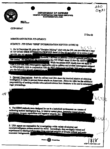Actionable indecency
Actionable indecency is a legal doctrine held by the Federal Communications Commission since the 1978 FCC vs. Pacifica case, that broadcast speech can be regulated even if it does not contain the seven dirty words deemed "indecent".[1][2][3]
The FCC states on its website that indecent broadcasts are not actionable between 10 PM and 6 AM;[4] however, in 1987, it announced that "actionable indecency" had been committed in broadcasts after 10 PM.[5]
Criticism of legal basis
The new definition of the "profane" is either co-extensive with indecency and therefore unnecessary, or so ambiguously more expansive as to pose even greater vagueness and overbreadth problems than the definition of indecency.— Levy 2008[6]
Legal scholars have questioned the constitutionality of the doctrine,[7] and indicated that it has been used to silence minorities such as gay men in the past.[8] One legal analysis of the doctrine found that it may no longer be necessary for the FCC itself to exist in order to protect children in the age of new media.[9]
See also
References
Notes
- ↑ Levy 2008, pp. 1–2.
- ↑ Levy 2008, p. 6 "though [George Carlin's] monologue was not obscene, it was indecent"
- ↑ FCC 2001 "FCC v. Pacifica Foundation, 438 U.S. 726 (1978), provides the judicial foundation for FCC indecency enforcement. In that case, the Supreme Court held that the government could constitutionally regulate indecent broadcasts. In addition, the Court quoted the Commission's definition of indecency with apparent approval."
- ↑ FCC 2015.
- ↑ Goodale & Frieden 2014, p. 6.58-7 "In 1987, in response to growing public and congressional concern about the amount of sex and violence on television, the FCC announced that it actively would begin to apply the definition of indecency used in the Pacifica case and would punish licensees that transmitted indecent programs. In 1987, the FCC concluded that three different broadcasts, two of which were aired after 10:00 p.m., constituted 'actionable indecency,' subject to punishment under the Communications Act."
- ↑ Levy 2008, p. 43a "The newly revived and potentially expansive category of the "profane" under Section 1464 also raises constitutional issues. Whatever the validity of the argument that Pacifica can serve as the springboard for expansive indecency regulation, it is certainly true that neither Pacifica nor any subsequent Supreme Court case opined on the constitutional permissibility of the commission’s definition of "profane" under Section 1464. That definition — including "personally reviling epithets," "language so grossly offensive to members of the public who actually hear it as to amount to a nuisance," and "vulgar, irreverent, or coarse language" — is even more open-ended than the agency's definitions of actionable indecency. The new definition of the "profane" is either co-extensive with indecency and therefore unnecessary, or so ambiguously more expansive as to pose even greater vagueness and overbreadth problems than the definition of indecency. In addition, an argument grounded on the history of the indecency rules' application might have constitutional traction."
- ↑ Levy 2008, p. 43b.
- ↑ Levy 2008, p. 2 "programs targeting particular groups (such as gay men) could all be found to have aired actionable indecency even if they did not use any of the forbidden words"
- ↑ Yokabitus 2012 "Children...are within an arm's reach of a world of indecent material: smart phones, laptops, late night premium television, etc. ... [I]f parents are tasked with the responsibility of protecting their children from exposure to indecent materials on these mediums, why can't we just add public television to list [sic] as well?"
Sources
- Industry Guidance On the Commission's Case Law Interpreting 18 U.S.C. § 1464 and Enforcement Policies Regarding Broadcast Indecency (Policy statement), Federal Communications Commission, April 6, 2001, EB-00-IH-0089
- "Obscene Indecent and Profane Broadcasts", Consumer Help Center (Official website), Federal Communications Commission, retrieved 2015-10-02
- Lipschultz, J. (2008), Broadcast and Internet Indecency: Defining Free Speech, Routledge Communication Series, Taylor & Francis, p. 195, ISBN 978-1-135-59628-6
- Goodale, J.C.; Frieden, R. (2014), All about Cable and Broadband, Communications law series, Law Journal Press, ISBN 978-1-58852-012-8
- Levy, Lili (April 2008), The FCC's Regulation of Indecency (PDF), First Amendment Center
- Yokabitus, Paul (July 20, 2012), "Actionably Indecent: Is the FCC Still Needed in Modern America?", Campbell Law Observer, Campbell University
